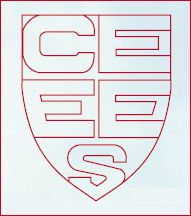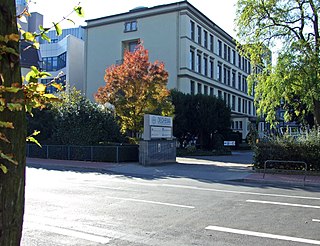
The Federal University of Paraná is a public university headquartered in Curitiba, Paraná, Brazil. UFPR is considered to be one of the oldest universities in Brazil.

The International Astronautical Congress (IAC) is an annual meeting of the actors in the discipline of space science. It is hosted by one of the national society members of the International Astronautical Federation (IAF), with the support of the International Academy of Astronautics (IAA) and the International Institute of Space Law (IISL). It consists of plenary sessions, lectures and meetings. The IAC is attended by the agency heads and senior executives of the world's space agencies.

The Confederation of European Environmental Engineering Societies (CEEES) was created as a co-operative international organization for information exchange regarding environmental engineering between the various European societies in this field.

Science and technology in Portugal is mainly conducted within a network of research and development (R&D) units belonging to public universities and state-managed autonomous research institutions. There are also non-state-run research institutions and some private R&D projects developed by companies.

Physics in Medicine & Biology is a biweekly peer-reviewed medical journal covering research on the application of physics to medicine, physiology, and biology. It was established in 1956 and is published by IOP Publishing on behalf of the Institute of Physics and Engineering in Medicine. It is also an official journal of the following medical societies: Canadian Organization of Medical Physics, Deutsche Gesellschaft für Medizinische Physik, Japanese Association of Radiological Physics, European Federation of Organisations for Medical Physics, and the International Organization for Medical Physics. The editor-in-chief is Katia Parodi.

DECHEMA is an abbreviation for "Deutsche Gesellschaft für chemisches Apparatewesen", though it has since been expanded to "Deutsche Gesellschaft für Chemische Technik und Biotechnologie".
The European Federation of Neurological Societies was an organisation that united and supported neurologists across the whole of Europe. As of 2013, 45 European national neurological societies were registered members of the EFNS, and the federation represented more than 19,000 European neurologists. It was founded in 1991 in Vienna, Austria.
The European Federation for Immunogenetics (EFI) is the European association of people with interests in the field of immunogenetics.
The Royal Netherlands Chemical Society is a learned society and professional association founded in 1903 to represent the interests of chemists and chemical engineers in the Netherlands. Currently the organisation has approximately 7,400 members.
The German Informatics Society (GI) is a German professional society for computer science, with around 20,000 personal and 250 corporate members. It is the biggest organized representation of its kind in the German-speaking world.
Life Sciences Switzerland (LS2) is the Swiss federation of scientific societies for life sciences. It was formerly known as the Union of the Swiss Societies for Experimental Biology (USGEB). It was founded in 1969, with the founding meeting taking place in Bern, Switzerland. At the founding, four societies, Swiss Society for Physiology, Swiss Society for Biochemistry, Swiss Society for Pharmacology and Swiss Society for Cell & Molecular Biology comprised the original societies.
The Swiss Informatics Society, short "SI", is a Swiss organization of computer science educators, researchers, and professionals.
The European Educational Research Association (EERA) is association of national and regional associations representing educational researchers in Europe. EERA aims to encourage collaboration amongst educational researchers in Europe, promote communication between educational researchers and international governmental organisations and disseminate and highlight state-of-the-art findings of educational research, primarily through the annual European Conference on Educational Research (ECER) and its associated journal, the European Educational Research Journal (EERJ), the EERA Blog and the EERA Book Series - Transdisciplinary Perspectives in Educational Research.
The European Federation for Animal Science or EAAP is an international non-governmental organisation which aims to improve the farming of domestic animals. Membership is open to scientists, animal breeders and administrators. The association was founded in Paris in 1949, and has its headquarters in Rome, Italy. It was formerly known as the European Association for Animal Production.

Pablo Artal is a Spanish physicist and full professor specialized in optics at the University of Murcia, as well as in the development and application of new techniques in human vision research. He received the Rey Jaime I Award for New Technologies in 2015. His main research topics are the optics of the eye and the retina and the development of optical and electronic imaging techniques in the field of biomedicine, ophtalmology and vision. He has contributed to the advance of methods for the study of the optics of the eye and contributed to the understanding of the factors that limit the resolution of the human vision. Moreover, his discoveries and ideas have been applied to instruments and devices used in the clinical practice of ophthalmology.
The Swiss Society for Optics and Microscopy (SSOM) (French: Société Suisse d'Optique et de Microscopie Électronique (SSOME); German: Schweizerische Gesellschaft für Optik und Elektronmikroskopie (SGOEM)) is a learned society for the promotion of optics and microscopy (and more recently nanotechnology) in Switzerland.
The International Council of the Aeronautical Sciences (ICAS) is a worldwide institution, established as an international forum for individual national aeronautical professional associations.
The International Science Council (ISC) is an international non-governmental organization that unites scientific bodies at various levels across the social and natural sciences. The ISC was formed with its inaugural general assembly on 4 July 2018 by the merger of the former International Council for Science (ICSU) and the International Social Science Council (ISSC), making it one of the largest organisations of this type.
This page is based on this
Wikipedia article Text is available under the
CC BY-SA 4.0 license; additional terms may apply.
Images, videos and audio are available under their respective licenses.







